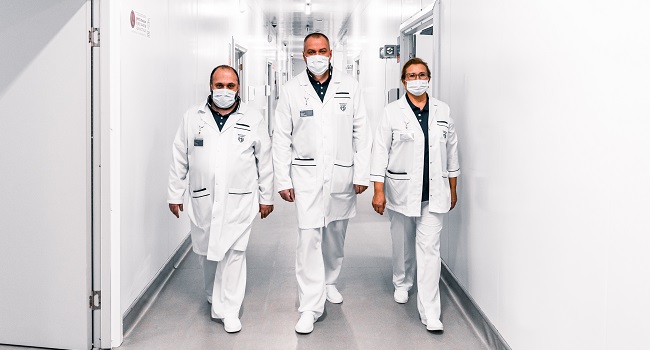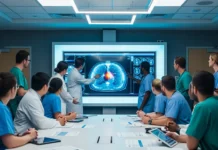In today’s fast-paced healthcare environment, effective leadership has become more critical than ever. As the industry continues to evolve and face new challenges, leaders must possess a unique set of skills to navigate these changes successfully.
Whether you’re just starting your career in healthcare or have been working in the field for years, there are always ways to improve your leadership abilities. In this article, we’ll explore seven simple yet powerful strategies that can help you become a better leader in modern healthcare settings. Let’s dive into how you can take charge and lead your organization toward success!
1. Lead by Example:
Leading by example is a time-honored principle that holds in any industry, including healthcare. As a leader in the modern healthcare environment, it’s essential to demonstrate your commitment to delivering quality patient care and staying up-to-date with advancements in technology. Start by adopting best practices within your organization, such as maintaining transparency regarding processes and decisions.
This will help instill trust among your team members while encouraging them to follow suit. Additionally, prioritize security measures in handling sensitive patient information. By investing time and resources into understanding data protection regulations like HIPAA or GDPR, you’ll create an atmosphere of safety for both patients and staff.
2. Communication Skills:
Effective communication is essential in any workplace, but it holds even more significance in the healthcare industry. As a leader in modern healthcare, it is crucial to possess excellent communication skills that will help you build strong relationships with patients and colleagues.
One of the primary ways to improve your communication skills as a healthcare leader is by being an active listener. When communicating with others, take time to listen attentively and respond appropriately. This not only helps you better understand your patient’s needs but also fosters trust within your team.
3. Use technology
In today’s technology-driven world, healthcare providers must embrace the use of technology to become leaders in modern healthcare environments. The appropriate use of technology can help improve patient outcomes and enhance clinical workflow efficiency. One way to leverage technology is by implementing electronic health records (EHRs).
EHRs provide a comprehensive digital record of a patient’s medical history which can be easily accessed by clinicians across different departments and locations. This reduces errors caused by incomplete or inaccurate medical records while improving communication between care teams.
4. The use of e-signatures
In today’s modern healthcare environment, being a leader is more important than ever. Great leaders can inspire their teams to provide better care for patients, achieve operational efficiency and drive innovation in the industry. One of the most critical aspects of leadership is ensuring compliance with regulations while providing excellent patient care. In this regard, e-signatures have become an essential tool for healthcare organizations. The use of electronic signatures automates documentation processes and ensures legal compliance while saving time and money. Also, e-signatures for the healthcare industry enable secure signing from anywhere at any time using any device without worrying about physically handling documents or meeting face-to-face during a pandemic-induced lockdown situation. As such, it increases workflow efficiency by reducing document delivery times and provides real-time visibility into document status tracking.
5. Continuous Learning:
In today’s rapidly changing healthcare industry, it is essential to keep up-to-date with the latest trends and advancements. Continuous learning is a crucial aspect of becoming a leader in modern healthcare. One way to stay informed about new developments is by attending conferences, seminars, and workshops.
These events provide an opportunity to network with other professionals in the field while gaining valuable insights into emerging technologies and best practices. Another useful method of continuous learning is participating in online courses or webinars. These platforms offer flexibility for busy healthcare professionals who may not have time to attend physical events but still want to expand their knowledge base.
6. Time Management & Organization:
One of the most important skills for any leader in the modern healthcare environment is time management and organization. With a never-ending list of tasks to complete, it can be easy to become overwhelmed and fall behind on important responsibilities.
To start with, leaders should prioritize their workload based on urgency and importance. This means identifying which tasks are critical and focusing on those first. It’s also essential to delegate appropriately and trust your team members to handle certain duties.
7. Encourage Teamwork & Collaboration:
In modern healthcare, teamwork, and collaboration are essential to providing high-quality care. Encouraging these values among your team can help improve patient outcomes and increase job satisfaction. One way to promote teamwork is to establish clear roles and responsibilities for each team member.
This helps everyone understand their contributions toward the common goal of delivering excellent care. Regular meetings and check-ins can also foster collaboration by allowing team members to share updates, ask questions, and provide feedback on their work. Encouraging open communication in these settings can facilitate problem-solving and lead to more effective solutions.

Becoming a leader in modern healthcare is not just about holding a position of authority. It is about being an influential figure who can inspire and guide their team toward providing better patient care. The seven simple and secure ways to become a leader that we have discussed here are all based on practical approaches that anyone can implement. Remember that becoming a successful leader takes time and effort. Keep working on developing yourself every day by practicing these strategies consistently.

















